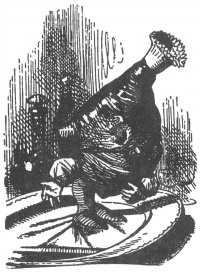Difference between revisions of "Chapter 16"
| (One intermediate revision by the same user not shown) | |||
| Line 1: | Line 1: | ||
| − | [[File:Chapter | + | [[File:Chapter 15.jpg|thumb|right|200px| EssJay claimed to have no less than four degrees in theology]] |
| − | <blockquote> | + | <blockquote>After two flights and a bus, followed by a scare-making taxi ride with the usual street apparatus – cars, tuk tuks, bicycles, people, cows, other animals, jostling for control of the highway – they were in Varanasi. They were dropped off at a crowded square where they made their way by foot through narrow medieval alleyways, filled with ‘every obstacle imaginable’, said Nic, who was accompanying Jimbo to make a documentary about Wikipedia. “We had little kids, people, cats, we had dogs, cows, an ox”. But the hotel was great, and the next morning, Jimbo took them for a boat ride on the Ganges. |
| + | </blockquote> | ||
| − | + | While Jimbo is in a ‘remote part of India’, a scandal breaks on Wikipedia. It is revealed by ''The New Yorker'' that an editor called EssJay, who claims to have no less than four degrees in theology, is an impostor, and is in fact an unemployed college drop-out. | |
| − | + | Yet the community already knows this. In the two months between Essjay’s deception becoming public in January 2007 and Jimbo’s trip to Varanasi at the end of February, those who question the deception are met by resistance, hostility or plain obfuscation, and often bullying. Wikipedia’s policy against harassment takes precedence over its policy on conflict of interest. | |
| + | “Conflict of interest likes to hide itself, that’s why it exists. Whenever you ask a question, conflict of interest will deny it, or be silent. So you have to ask ''again''. But then Wikipedia’s policies on harassment come into play, which define harassment as a repeated pattern of behaviour that the other party finds unwelcome, ''such as asking about conflict of interest''. And because one policy trumps the other, it is impossible to challenge it. Conflict of interest knows this. It will never acknowledge itself, knowing that it does not have to, for it will be defended by Wikipedia policy, always, and by the Wikipedian culture that requires you to ‘assume good faith’”. | ||
| + | <div style="clear:both;"></div> | ||
<noinclude> | <noinclude> | ||
==See also== | ==See also== | ||
| Line 13: | Line 16: | ||
[[Category:Chapters]] | [[Category:Chapters]] | ||
| + | [[category:Released]] | ||
</noinclude> | </noinclude> | ||
Latest revision as of 16:35, 5 April 2014
After two flights and a bus, followed by a scare-making taxi ride with the usual street apparatus – cars, tuk tuks, bicycles, people, cows, other animals, jostling for control of the highway – they were in Varanasi. They were dropped off at a crowded square where they made their way by foot through narrow medieval alleyways, filled with ‘every obstacle imaginable’, said Nic, who was accompanying Jimbo to make a documentary about Wikipedia. “We had little kids, people, cats, we had dogs, cows, an ox”. But the hotel was great, and the next morning, Jimbo took them for a boat ride on the Ganges.
While Jimbo is in a ‘remote part of India’, a scandal breaks on Wikipedia. It is revealed by The New Yorker that an editor called EssJay, who claims to have no less than four degrees in theology, is an impostor, and is in fact an unemployed college drop-out.
Yet the community already knows this. In the two months between Essjay’s deception becoming public in January 2007 and Jimbo’s trip to Varanasi at the end of February, those who question the deception are met by resistance, hostility or plain obfuscation, and often bullying. Wikipedia’s policy against harassment takes precedence over its policy on conflict of interest.
“Conflict of interest likes to hide itself, that’s why it exists. Whenever you ask a question, conflict of interest will deny it, or be silent. So you have to ask again. But then Wikipedia’s policies on harassment come into play, which define harassment as a repeated pattern of behaviour that the other party finds unwelcome, such as asking about conflict of interest. And because one policy trumps the other, it is impossible to challenge it. Conflict of interest knows this. It will never acknowledge itself, knowing that it does not have to, for it will be defended by Wikipedia policy, always, and by the Wikipedian culture that requires you to ‘assume good faith’”.
